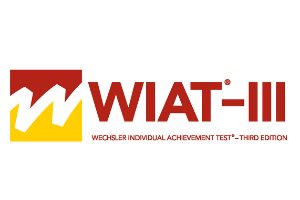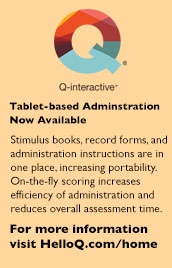Description
Wechsler Individual Achievement Test® | Third Edition (WIAT®-III) is an individually administered achievement test for use in a variety of clinical, educational, and research settings.

Wechsler Individual Achievement Test® | Third Edition (WIAT®-III) is an individually administered achievement test for use in a variety of clinical, educational, and research settings.
Wechsler Individual Achievement Test® | Third Edition (WIAT®-III) is an individually administered achievement test for use in a variety of clinical, educational, and research settings.
Updated achievement test for use in a variety of clinical, educational, and research settings
Age Range:Individuals 4:0-50:11
Administration:Paper-and-pencil or online administration
Scoring Option:Q-interactive web-based administration and Q-global™ web-based scoring
The WIAT-III is suitable for use in a variety of clinical, educational, and research settings, including schools, clinics, private practices, and residential treatment facilities. Use WIAT-III results to:

With a total of 16 subtests, WIAT-III offers:
The WIAT-III was nationally standardized on 3,000 students and adults and features comprehensive normative information.
The WIAT-III was correlated with the following ability measures:
This combination report allows you to upgrade your WPPSI–IV or WIAT–III Score Report to include a pattern of strengths and weaknesses analysis and an ability achievement discrepancy analysis of the combined results.
The first option is to pay per-report. Customers who administer the WIAT-III only a few times each year, or those who want the flexibility to pay only as the assessment is used, may prefer this option.
The second option is to select an “unlimited use” subscription, where one user of the WIAT-III gets unlimited scoring and reporting for one, three, or five years depending on the selected term of the subscription. This may be a better option for customers who administer the WIAT-III several times each year—and don’t want to worry about keeping track of their report expenses.
Q-global™ Web-based Administration, Scoring, and Reporting – Enables you to quickly assess and efficiently organize examinee information, generate scores, and produce accurate comprehensive reports all via the Web.
WIAT-III on Q-global also provides:
For a description of subtests and composites, click here.
Two pricing options are now available for scoring and reporting on Q-global. In addition to the current per-report price, there is now an unlimited-use scoring and reporting subscription available in one-, three-, and five-year terms.
Important note: Each subscription is per user for the WIAT-III only and will begin on the date of order processing unless otherwise requested.
Assessing Writing Skills Using Correct-Incorrect Word Sequences (PDF – 329KB)
Quick Score Guide for WIAT-III Essay Composition (PDF – 507KB)
Patterns of Strengths & Weaknesses Models for Identifying SLD (NASP 2010)
This pre-recorded 20-30 minute session allows you to learn at your leisure. All you need is access to the Internet and the sound enabled on your computer. Please keep in mind that the session may take a few minutes to load.
This session provides you with essential information regarding the features of the WIAT-III.

Presenter: Adam Scheller, Ph.D., Senior Educational Consultant with Pearson Clinical Assessment

School districts across the country have adopted new and modified old(er) special education evaluation processes in line with the requirements outlined in IDEIA 2004. Since this revised legislation opened the door for schools to use several different means to qualify students with special education needs, we have witnessed an explosion of RTI programs and a subsequent decline in discrepancy-model usage. However, one area included in the law has received less fanfare, the process of analysing the concordance (and thus discordance) between related cognitive and academic processes. During this one-hour webinar Dr. Scheller will review this process of cognitive hypothesis testing by taking an in-depth look at how to apply widely used assessments such as the WISC-V, KTEA-3, and WIAT-III. Dr. Scheller’s goal in this one-hour webinar will be to help take clinicians to a level of detail and accuracy when forming and testing hypotheses about a child’s patterns of thinking and learning.
Date: May 20, 2016
![]() PDF: Application of Cognitive Hypothesis Testing Using PSW Analysis
PDF: Application of Cognitive Hypothesis Testing Using PSW Analysis
![]() Video: Application of Cognitive Hypothesis Testing Using PSW Analysis
Video: Application of Cognitive Hypothesis Testing Using PSW Analysis
Presenter: Adam Scheller, PhD

The Wechsler Individual Achievement Test–Third Edition (WIAT-III), an individually administered measure of oral language, reading, written language, and mathematics, is used in schools, clinics, private practices, and residential treatment facilities. This webinar will focus on one component of WIAT-III – the Sentence Composition subtest. During the hour-and-a-half long presentation, the presenter will describe and demonstrate the criteria used to score the two components of Sentence Composition. Participants will be able to view sample responses to evaluate semantics, grammar and mechanics.
Date: Dec 19, 2011
Presenter: Gloria Maccow

The Wechsler Individual Achievement Test–Third Edition (WIAT-III), an individually administered measure of oral language, reading, written language, and mathematics, is used in schools, clinics, private practices, and residential treatment facilities. This webinar will focus on one component of WIAT-III – the Sentence Composition subtest. During the hour-and-a-half long presentation, the presenter will describe and demonstrate the criteria used to score the two components of Sentence Composition. Participants will be able to view sample responses to evaluate semantics, grammar and mechanics.
Date: Sep 26, 2011
Presenter: Gloria Maccow

The Wechsler Individual Achievement Test–Third Edition (WIAT-III) is an individually administered measure of oral language, reading, written language, and mathematics. The WIAT-III is used in a variety of clinical, educational, and research settings, including schools, clinics, private practices, and residential treatment facilities.
During this hour-and-a-half long webinar, the presenter will describe administration and scoring of the WIAT-III subtests and interpretation of WIAT-III data.
Date: Sep 08, 2011
Presenter: Amy Gabel, PhD

During this webinar we will describe how clinicians use the WAIS-IV and WIAT-III in the evaluation of college students. A case example will be provided.
Date: Apr 11, 2011
Presenter: Gloria Maccow

During this two-hour webinar, the presenter will describe the administration directions for each subtest. In addition, participants will learn how to generate a raw score for each subtest and how to convert raw scores to standardized scores.
Date: Feb 02, 2011
Presenter: Gloria Maccow

This webinar will focus on one component of the WIAT-III: the Essay Composition. During the hour-and-a-half long webinar, the presenter will describe and demonstrate the criteria used to score the essay. Participants will view sample essays to evaluate content and organization. Most of the session will be devoted to scoring criteria for theme development and text organization.
Date: Dec 01, 2010
Presenter: Amy Gabel

Join us for this webinar that addresses some of the common questions and answers regarding the WIAT-III. If you have specific questions that you would like to see addressed, please send them to the presenter, Dr. Amy Gabel, at least 3 weeks in advance of the session. In order to submit a question, please send an email to: amy.gabel@pearson.com with the Subject Line: WIAT-3 QA Webinar.
Date: Dec 01, 2010
Presenter: Gloria Maccow

The Wechsler Individual Achievement Test–Third Edition (WIAT-III), an individually administered measure of oral language, reading, written language, and mathematics, is used in schools, clinics, private practices, and residential treatment facilities. This webinar will describe the interpretation of data from the WIAT-III: Reading Comprehension subtest. The presenter will describe how clinicians use data from the Reading Comprehension subtest to identify the nature of a student’s reading difficulties. Using sample data, the presenter will describe the component skills that are required to demonstrate reading comprehension and the interventions that are indicated based on the student’s scores.
Date: Dec 01, 2010